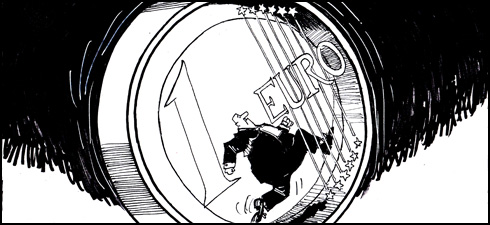**January 1 2002 is probably one of the few days that every adult European can remember. It was the day on which a cup of mulled wine for the kids on the slopes in Garmisch for the first time cost one euro – instead of two marks. In the cities there was hardly a cash machine without a long queue of people standing in front of it. And everyone was walking about with little plastic bags stuffed with freshly minted euro coins, the “household coin mixtures”. One admired in passing the first foreign obverse sides to German coins – Mozart here, the Belgian king there, and what was that Spaniard named again? Three hundred and seven million Europeans had a new currency.
That was exactly ten years ago. So now, finally: Happy Birthday, dear euro, let’s celebrate – corks should be popping. But preparations for the big Jubilee, it seems, are remarkably glum. The European Central Bank (ECB), still the highest monetary authority in Europe, is planning a Visitors’ Day “in the second quarter of 2012,” and a “Euro Run” competition for students from 1 January to 31 March. Plus, there’s a commemorative coin, and video clips on the ECB website demonstrating anti-counterfeiting security features and coin production.**
Minimalist birthday
In contrast, even International Green Week in Berlin looks like an orgy. The Federal Bank is going one step further and is limiting itself to an information package, which has been downloadable from the website since the start of December. It’s called “Fact Sheet on Ten Years of Euro Cash”. The title is clear, precise – and anything but festive. “We have other worries,” explains a representative of the institution's press service. Could the euro be even worse off than we imagined?
At the EU Commission, in any case, “there are no events or celebrations currently being planned.” At the Chancellery, similarly, there have been “no deliberations” on any euro anniversary, and the Ministry of Economic Affairs did not even respond to an enquiry.
In the ECB clips of the anniversary there is hardly a word on the monetary crisis. Nevertheless, the Bank does issue a kind of warning, namely on the periods for converting older currencies into euros that are finally expiring. As of 1 March 2012, for example, the Bank of Greece will no longer be converting drachmas into euros. The old Greek currency will be worthless.
Was this article useful? If so we are delighted!
It is freely available because we believe that the right to free and independent information is essential for democracy. But this right is not guaranteed forever, and independence comes at a cost. We need your support in order to continue publishing independent, multilingual news for all Europeans.
Discover our subscription offers and their exclusive benefits and become a member of our community now!












